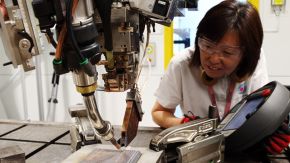
UK initiative to expand nuclear workforce
The UK civil and defence nuclear sectors have launched a "first-of-its kind collaborative cross-sector initiative" - known as Destination Nuclear - aimed at boosting the workforce to help deliver the country's nuclear expansion ambitions.
.jpg?ext=.jpg)
(Image: Nuclear AMRC)
The sector is launching the initiative to attract and recruit people over the next two decades, as it enters a new era of government-backed expansion. The civil and defence nuclear workforce will need to double over the next 20 years - supporting around 80,000 additional skilled jobs across the UK.
The new initiative - which brings together government, private sector organisations and their supply chains, education institutions - aims to deliver against the UK's nuclear ambition by attracting and recruiting more people into the industry to help fill critical skills gaps.
The Destination Nuclear campaign will target those considering a career change with transferrable skills, as well as supporting a commitment to apprenticeships and graduate schemes and increasing the opportunity for PhD students across industry-leading organisations. The nuclear sector will work with other sectors and develop training programmes to re-skill people who may be transferring from other industries.
Techniques already being used by those working in other sectors including construction and manufacturing – digital, robotics and artificial intelligence - will also be harnessed to fill nuclear roles such as welding, systems engineers, project planning and civil and structural engineers.
The campaign will also benefit national and regional employment, as well as supporting broader EDI (equality, diversity and inclusion) and social mobility goals through reaching a much broader audience.
"Destination Nuclear has provided a focal point where the sector has come together to deliver this vital campaign programme," said Lynne Matthews, Head of Destination Nuclear. "To deliver our nuclear ambition we need to significantly grow the workforce. Many potential candidates may have not considered nuclear as a career. Destination Nuclear will help show the wealth of opportunities the sector has to offer and help a broader range of people explore and venture into a career that is challenging, rewarding and sustainable."
"For those of us who have been in the industry for a while and passionate about its future contribution to society, Destination Nuclear is a game changer," added Great British Nuclear Chairman Simon Bowen. "It demonstrates how a united effort can result in delivering huge benefit with everyone collaborating for the future success of the industry."
EDF Energy CEO Simone Rossi commented: "EDF's nuclear businesses aim to hire more than 1000 people this year, to work at power stations, new build projects and in technical and support roles. It is an exciting time to be working in the sector but finding enough of the right people is challenging. That is why we are supporting Destination Nuclear to help more people realise the wealth of opportunities in this vital sector."
In January, the British government launched a roadmap for reaching its ambition for the UK to have 24 GWe of nuclear generating capacity by 2050, representing about 25% of the country's projected electricity demand. It said the Civil Nuclear Roadmap "outlines plans for the biggest expansion of nuclear power for 70 years to reduce electricity bills, support thousands of jobs and improve UK energy security - including exploring building a major new power station and investing in advanced nuclear fuel production". Nuclear's share of energy in the UK is currently about 16%, however all but one of its existing reactors are due to retire by 2030. The nuclear workforce will expand further following the AUKUS nuclear submarine partnership.
"The UK has begun the biggest nuclear power expansion in 70 years, with our world leading SMR competition and plans for a new mega nuclear plant similar in scale to Sizewell or Hinkley," said Minister for Nuclear Andrew Bowie. "To meet our ambitions, we need to rapidly ramp up recruitment in the sector, making sure we have enough people from engineers to welders to design and build new nuclear. Nuclear has fantastic career opportunities, and we want people of all ages to consider joining a key industry of the future."
News by Category
- BECBC
- Cumbria
- Nuclear
- Social Value
- Professional Services
- Clean Energy
- Business
- People
- Government
- BECBC Member News
